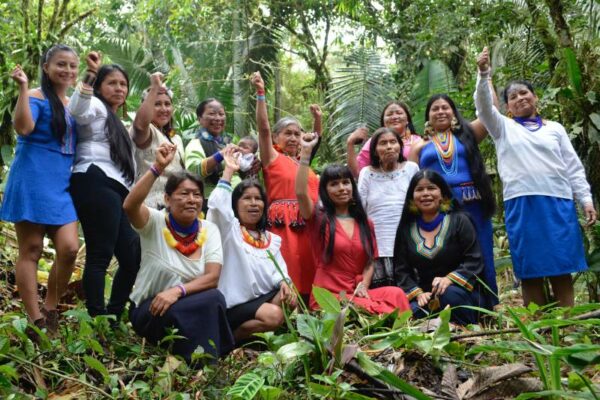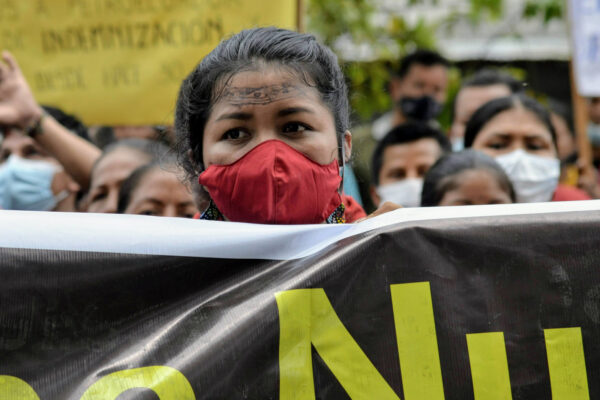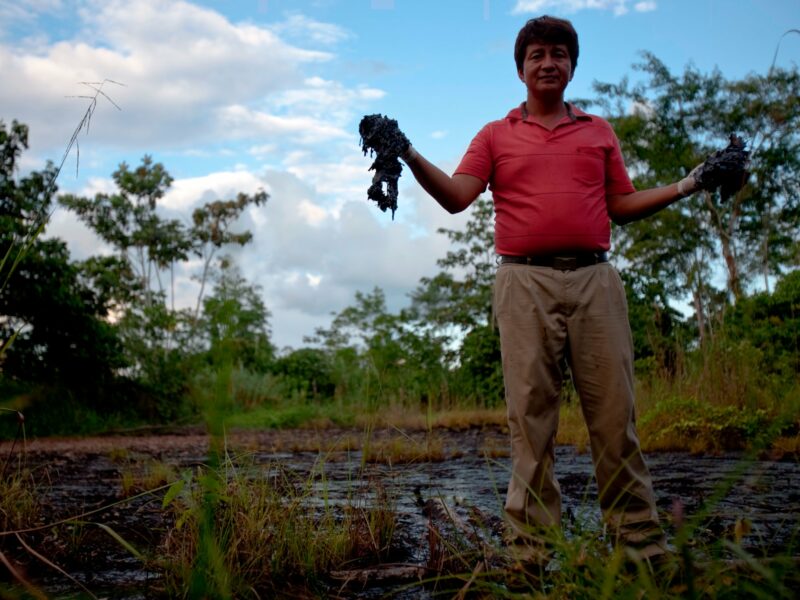San Ramon, CA – At Chevron’s annual meeting today, shareholders and dozens of environmental and human rights organizations told Chevron CEO Michael Wirth that the company must act to change its course of environmental and social irresponsibility. Five different resolutions supported by shareholders representing billions of dollars in assets under management urged the company to address a wide range of climate change and human rights issues
Michael Wirth, in his second year as CEO, has yet to shift Chevron’s harmful practices and efforts to silence those critical of its operations and abuses.
Thus, Chevron was recently named the “Corporate Bully of the Year” by the Protect the Protest task force for its SLAPP attacks and other legal bullying tactics against individuals who have spoken out about the oil giant’s toxic contamination in the Ecuadorian Amazon. Chevron has not cleaned up or helped the many thousands of Ecuadorians suffering a continual health crisis, after abandoning close to 1000 oil waste pits in Ecuador 27 years ago.
Today, Wirth refused to accept any responsibility at the shareholder meeting and cited Chevron’s retaliatory Racketeer Influenced and Corrupt Organizations Act (RICO) verdict to claim there’s no scientific evidence of contamination. This despite the fact that the RICO decision explicitly says, “The questions whether and why there is pollution in the Oriente region and whether Chevron’s experts were aware of that simply have nothing to do with the case.” In fact, for the second year in a row, Wirth claimed that the real tragedy in Ecuador was trial lawyers allegedly “taking advantage of” Ecuadorians.
This year, Chevron faces three climate-related resolutions, including one that calls on the company to outline how it will reduce its carbon footprint in line with the Paris climate agreement’s global temperature goals – which would mean bringing its emissions of heat-trapping gases to net zero by mid-century. Chevron recently committed to reducing its operations’ carbon intensity by less than 1% of its 2016 total emissions over the next seven years. Yet this is nowhere near what is needed for the company to fall in line with the goals of the Paris climate agreement.
Chevron is also under increasing pressure to pledge not to drill in the Arctic National Wildlife Refuge. Considered sacred to the Gwich’in Nation and key to their food security and way of life, this delicate wilderness has been protected for generations, until a provision in the 2017 tax bill opened it for oil and gas leasing. The Trump administration has been pushing for drilling on an accelerated schedule ever since, and it hopes to hold a lease sale in the Arctic Refuge’s coastal plain as soon as this fall. Chevron has expressed support for the Trump administration’s plans to sell off the coastal plain for drilling, and representatives from the Gwich’in Nation attended today’s meeting to urge Chevron executives to rethink these destructive plans and leave the Arctic Refuge intact.
In spite of Chevron’s efforts to distance itself from Ecuador and other toxic projects around the world, its Richmond refinery is one of California’s biggest polluters, and Chevron refineries across the United States are the largest purchasers and processors of crude oil imported from the Amazon rainforest. The extraction and processing of Amazon crude continues to destroy the climate-protecting rainforest and threaten the rights of indigenous peoples from Ecuador to California.
Challenged by institutional shareholders, climate activists, human rights advocates, and indigenous leaders today, Chevron’s board, CEO, and senior management received yet another wake-up call about the risks of its business model.
Statements:
The Union of Peoples Affected by Texaco/Chevron in Ecuador said:
“What happened on May 21st for International Anti-Chevron Day is a sample of what the company can expect every year: more than 290 organizations, representing over 280 million people, demonstrated against Chevron this year. We will continue to denounce the crime that Chevron committed until it takes responsibility for the environmental damage for which Texaco – which merged with Chevron in 2001 – is wholly responsible. We want you to understand that we – the affected indigenous and campesino communities will not falter until we have achieved our goal that your company pay for its crime and remediates our Amazon rainforest.”
Tilisia Sisto, Gwich’in Steering Committee Representative said:
“The traditional territory of my people, the Gwich’in Nation, spans what is now known as the Alaskan and Canadian Arctic. I traveled halfway across the world from my home in Alaska to attend Chevron’s shareholder meeting today, to explain how important the coastal plain of the Arctic National Wildlife Refuge is to my people and to urge Chevron not to drill in our sacred lands. Yet in response the chairman told shareholders and the board lies about how “clean” and “safe” drilling in the Arctic would be, not the truth about the impact of drilling on my people and on our global climate.”
Annie Leonard, Executive Director of Greenpeace USA, which is a member of the Protect the Protest Task Force, said:
“Chevron’s litigation strategy is to bully, harass, and intimidate. Because of this, Chevron received Protect the Protest’s Corporate Bully of the Year Award this year. Chevron has been ramping up its bully tactics in what has been described as the ‘vengeance stage’ of its 25-year long legal effort to avoid accountability for oil spills in Ecuador. The Protect the Protest Task Force provides support to people who speak out against corporate bullies like Chevron.”
Isabella Zizi of Stand.Earth said:
“As someone who grew up in the shadows of the Richmond Chevron refinery, I understand how oil industries like Chevron destroy communities. The corporate and scripted lies to shareholders was heart-wrenching to hear since it seems its only message is to protect the name of the company. Chevron can be on the right side of history and stay away from the Arctic Refuge and move towards a clean energy future. The CEO mentioned that they have been in business for over 140 years and plan to be in business for another 140 years and I am committed to make sure this doesn’t happen.”
Nicole Pinko, corporate analyst at the Union of Concerned Scientists said:
“Chevron is barely nibbling around the edges when it should be taking massive bites into its emissions. So far Chevron has committed to reducing its operations’ carbon intensity by a less than 1% of its 2016 total emissions over the next seven years. The company should instead be slashing its emissions, especially those that come from burning of its products, which make up 80% of the company’s lifecycle of global warming gases.”
Dr. Benjamin Franta of Stanford University said:
“When asked about the growing number of climate liability lawsuits facing the company, Chevron’s CEO Michael Wirth announced to shareholders that there is no new science and no new evidence to back up these cases. Both of those claims are false. There’s a rapidly developing field of attribution science that can link Chevron’s products to climate damages such as rising temperatures and sea levels. Likewise, there’s a growing body of historical research showing the company deceived the public about the dangers of its products. Shareholders should be nervous that their company’s CEO is so misinformed about these lawsuits.”
Moira Birss of the BlackRock’s Big Problem campaign said:
“Our collective future was once again compromised by the failure at Chevron’s shareholder meeting of a resolution requiring a report on reducing its carbon footprint. If BlackRock, Vanguard, and State Street – which collectively own more than 20% of Chevron – voted against the resolution – which got 33.2 of the vote – these asset managers were the deciding votes determining the resolution’s failure.”
Ortal Ullman, fossil fuel accountability campaign coordinator with the Union of Concerned Scientists said:
“While Chevron is facing lawsuits brought by fifteen cities, counties, and states seeking damages for climate impacts, the company is still dragging its feet on climate solutions. Chevron’s history of spreading climate disinformation and its ongoing support of industry groups that do the same is not just hurting our chances at climate progress – it’s leaving its own shareholders open to significant financial risk. As a growing number of international fossil fuel companies are taking a serious look at the climate positions of their trade associations, the bar is rising for the entire industry. It’s well past time for Chevron to part ways with anti-climate lobbyists such as the American Legislative Exchange Council (ALEC) and get serious about solutions.”
Paul Paz y Miño, Amazon Watch Associate Director said:
“It was absolutely shocking to witness the outright lies and denial of reality from CEO Michael Wirth. Not only did he belittle the suffering of the communities harmed by Chevron’s deliberate destruction in the Amazon, he refused to even acknowledge the scientific fact of the toxic contamination in Ecuador. I challenged him to be brave enough to at least admit the truth of the contamination and he utterly failed. Hiding behind these transparent lies will not save Chevron from justice as the Ecuadorian people and the global community behind them continue the call for true accountability.”
Sister Nora Nash of the Sisters of St. Francis of Philadelphia said:
“Chevron’s operations have an enormous impact on water rights and other climate solutions. Though it claims to have a human rights policy that addresses these concerns, the policy is nowhere near adequate – it fails to meet international human rights standards – and Chevron doesn’t even live up to its own policy commitments. Chevron must respect the human right to water.”













